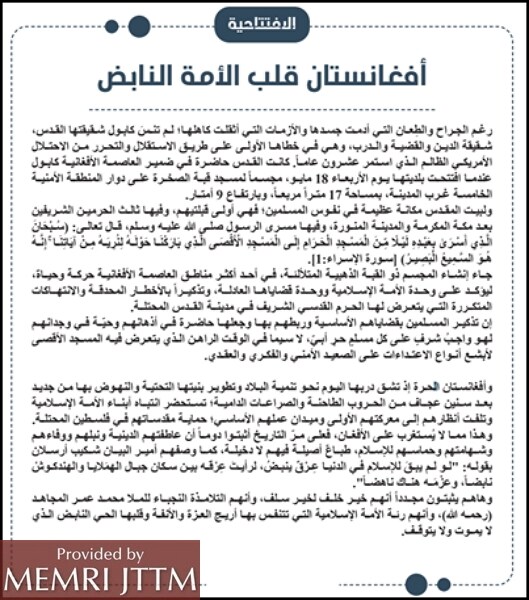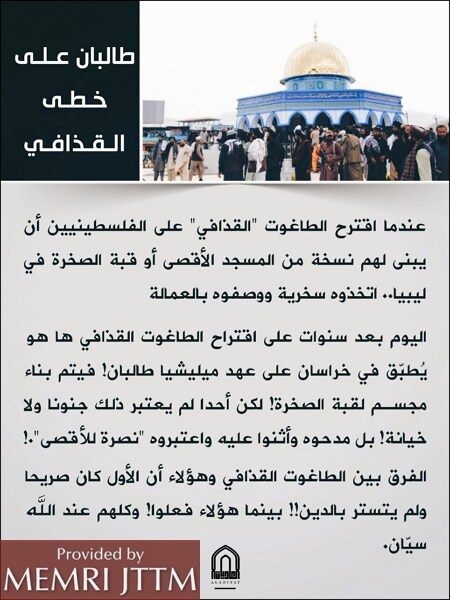The following report is now a complimentary offering from MEMRI's Jihad and Terrorism Threat Monitor (JTTM). For JTTM subscription information, click here.
On May 21, 2022, the Islamic Emirate of Afghanistan (the Afghan Taliban) published issue 196 of their official Arabic-language monthly magazine, Al-Somood. The editorial on the third page of the issue is titled "Afghanistan: The Beating Heart of the Islamic Nation."[1]

In the editorial, a parallel is drawn between Kabul and its "sister" city Jerusalem. The writer argues that Kabul was the first of the two cities to achieve liberation when it was freed from "the oppressive American occupation that lasted 20 years." In honor of Jerusalem, on May 18 the municipality of Kabul inaugurated a three-dimensional replica of Jerusalem's Dome of the Rock, inside a roundabout. The replica covers an area of 17 square meters and is nine meters high.
The editorial recalls the importance of Jerusalem in Islam as the first qiblah (direction of prayer) for Muslims; the third holy city in Islam after Mecca and Medina; and the city from which the Prophet Muhammad ascended to the sky in his night journey, known as the mi'raj.

An image of the Dome of the Rock replica built by the Taliban in Kabul (on the left) next to an image of the original in Jerusalem
It asserts that the construction of a replica of the Dome of the Rock in the Afghan capital emphasizes the unity of the Islamic nation and the "unity of just causes" and serves as a "reminder of the dangers, threats and repeated violations to which Al-Haram Al-Sharif [the Arabic name for the Temple Mount containing the Dome of the Rock] has been exposed." Through the replica, the question of Jerusalem is "made present in the minds and alive in the consciousness" of Muslims. The editorial further argues that "free Afghanistan" today is on its way towards "development of its infrastructure and advancement," after years of "grinding wars and bloody conflicts." The Taliban rulers of Afghanistan vowed to "bring to the attention of the Islamic nation the protection of the holy places in occupied Palestine."
Several ISIS supporters voiced criticism of the project. ISIS is a fierce enemy of the Taliban and often voices opposition to their rule and actions. Two days after the inauguration of the replica, a pro-ISIS media outlet, the Al-'Adiyat Foundation, released a poster ridiculing it.[2] It argued that building a model of the Dome of the Rock had originally been proposed by Libya's Muammar Al-Qaddafi, and was widely mocked at the time. However, the poster contends, when the Taliban announced their intention, their act was praised as a "defense of Al-Aqsa." Al-'Adiyat claimed that the only difference between Qaddafi and the Taliban is that the former did not "appear in the guise of religion," while the latter claimed to represent Islam, but "all of them are the same to Allah."

The poster released by the pro-ISIS Al-'Adiyat Foundation criticizing the Taliban
The full text of this post is available to subscribers.
Please login or register to request subscription information from MEMRI




